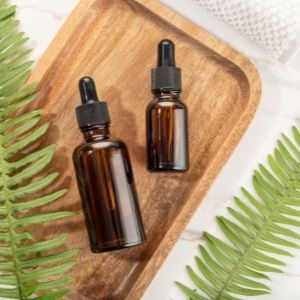
Which carrier oil should you choose?
Essential oils must always be diluted with a carrier oil before being applied to the skin. Without the use of carrier oils, aromatherapy is not safe. And if you are careful to use only pure and truly 100% pure essential oil, the carrier oil should be just as pure.

What is a carrier oil?
Carrier oils (base oil, carrier oil) are produced from plants and are used to dilute essential oils and apply them to the skin. The carrier oil can be any vegetable oil used to dilute the essential oil, most often from seeds, cereals or nuts.
It is always advisable to dilute the essential oil used for skin care with at least one carrier oil before applying it to our skin. Pure undiluted essential oil is so concentrated that it can irritate the skin thus causing allergic symptoms.
Most carrier oils are odorless or slightly fragrant and do not affect the therapeutic properties of the essential oil. They can be used alone or in combination with other oils to nourish the skin.
The more refined a carrier oil, the less nutritional it is. The only substance that should not be used in aromatherapy is mineral oil, a by-product of petroleum production.
We have a wide range of carrier oils available. Most are suitable for use with any essential oil, but there are a few things to consider before choosing.
Odor: Some carrier oils have a strong odor, so when added to the essential oil, it can change its aroma.
Absorption: Some carrier oils are better absorbed into the skin, while others have a heavier or even more oily effect on the skin.
Skin Type: Depending on the type of skin, some oils may irritate the skin or worsen the condition of the skin, such as acne. A sensitivity test should also be performed for all carrier oils.
Shelf life: Certain carrier oils can be stored for a longer period of time without deterioration.
Only buy good quality carrier oils from a reliable manufacturer. Choose cold pressed oil that is 100% pure and free of additives or preservatives. If you want to use cooking oil as a carrier oil, look for cold pressed, natural varieties.
In the list below, I have compiled the more well-known carrier oils. This is not an evaluation sequence, as many times different carrier oils may be needed for the problem.
Coconut oil is an edible oil made from the flesh of ripe coconuts. Available in refined or unrefined form.
Unrefined coconut oil is unprocessed, contains no chemicals and retains the aroma and taste of coconut. Refined coconut oil is derived from dried coconut meat, also known as copran.
The refined version is not completely natural and is not recommended for use as a carrier oil.
Uses: Coconut oil contains skin nourishing fatty acids and polyphenols, which serve as a great carrier oil for massage oils and skin care products.
Jojoba oil comes from the seeds of the jojoba plant and has a pleasant aroma. Technically, jojoba is not an oil but a wax with strong moisturizing properties and mimics the sebum on the skin. The use of jojoba oil can reduce the oiliness of the skin in people prone to acne as it suppresses excessive sebum production.
Jojoba oil is absorbed extremely quickly. It softens and moisturizes dry skin, helps heal wounds and is also very effective against psoriasis. It can also be used for acne and oily scalp, and due to its antioxidant properties, it is also recommended for use in face creams, massage oils and hair care products.
Jojoba oil is one of the best choices if you want to use it in perfume because of its scent-fixing effect. The fragrance composition dissolved in jojoba oil evaporates more slowly from the skin surface as the jojoba oil binds the essential oils dissolved in it.
Apricot kernel oil is made from the seeds of apricots, has a emollient effect and is rich in fatty acids and vitamin E. It is easily absorbed into the skin and has a slightly sweet scent. It can also be purchased for cosmetic use, but is also edible.
Uses: Apricot kernel oil is believed to help relieve and soothe irritated, itchy skin. Use as a carrier oil for massage oils, bath oils and hair care products.
4. Almond oil
Also known as almond oil, it is a light-textured, pale yellow oil with a nutty aroma. Due to its slightly slippery, slightly sticky feel, it is an excellent base for massage mixtures. It is soothing and extremely nutritious. Due to its vitamin E content, linoleic acid is suitable for the treatment of itchy, dry, peeled skin. Fits all skin types. Excellent carrier oil.
Uses: Sweet almond oil is one of the most popular carriers for skin care. Great for use in massage oils, bath oils and soaps.
5. Olive oil
Olive oil comes from pressed olives. It is the best known healthy cooking oil. It has a fruity scent, but it is also used as an aromatherapy carrier oil. Extra virgin olive oil is preferred for aromatherapy and skin care products, but its scent can affect some of its essential oils.
Olive oil is suitable for healing both hair and skin, it heals, soothes and spreads very well. Due to its characteristic odor, it is worth mixing with stronger essential oils, such as. rosemary, basil, tea tree, or thyme.
Usage: It is full of fatty acids and phytosterols, which are excellent for cleansing and hydrating dry skin.
6. Argan oil
Argan oil is made from the seeds found in the fruits of Moroccan native argan trees. The oil is edible and excellent for nourishing the skin. It has a hazelnut aroma and is rich in vitamins A and E and unsaturated fatty acids.
Uses: Argan oil can help treat dry skin and hair, wrinkles and dermatitis. A fantastic carrier oil for general skin care and massage oils.
7. Rosehip oil
The rich orange-red oil is especially rich in essential fatty acids and vitamin A precursor, which contributes to maintaining the health of the cell membrane and regenerating skin tissues. Reduces scarring, smoothes wrinkles and lightens pigmentation. It is considered to be an excellent medicinal oil, e.g. it is also effective on burnt skin and softens skin tissues, e.g. during a runny nose, the reddened nose can also be smeared. It delays the aging of the skin and delays the vulnerability of the capillaries.
Uses: Rosehip oil is rich in vitamins A and C. Vitamin A is a natural retinoid that helps fight aging, and both vitamins help reverse the effects of sun damage. Use as a carrier oil for dry skin care, massage oils and moisturizers.
8. Nigella Seed Oil (Black Seed Oil)
Nigella sativa is made from a plant. Less known than other carrier oils, it is rich in unsaturated and saturated fatty acids and is believed to have anti-inflammatory properties.
Uses: Black seed oil is often used as a folk medicine to soothe skin diseases including eczema, acne and psoriasis. With this in mind, it is an excellent choice for facial and massage oils, as well as general skin care.
9. Grape seed oil
Grape seed oil is derived from grape seed, which is a by-product of the winemaking process. Rich in vitamin E, it heals the skin and reduces wrinkles.
Usage: Grape seed oil is light, easily absorbed into the skin and has a neutral odor. It is a good carrier oil used for essential oils to make body lotions and massage oils.
10. Avocado oil
Avocado oil is a heavy, full-bodied edible oil extracted from the avocado fruit. It has a hazelnut aroma. Avocado oil is rich in monounsaturated fatty acids, which are believed to help care for dry, damaged skin.
The wonderfully rich, green oil contains significant amounts of essential fatty acids, vitamins E, D, carotene and linoleic acid - the latter taking care of the health of the cell membranes in our body. Avocado oil is excellently absorbed, softens and hydrates the skin. It can be used for all skin types, but is especially recommended for dry, damaged, aging skin.
Avocado oil nourishes and rejuvenates dry and dehydrated skin. A rich heavy oil is therefore best used in admixture with other carrier oils. It is high in vitamins A and E, which is why it is very good for treating skin problems.
11. Sunflower oil
Sunflower oil is a cooking oil extracted from sunflower seeds and has a neutral odor. This oil is believed to be effective against toxins and bacteria that cause skin infections.
Usage: Helps soften, hydrate and soothe skin. Feel free to add as a carrier oil to massage oils or general skin care products.
12. Borage oil
Borage oil stimulates cell function and promotes regeneration. It can be used on almost all skin types, but is best for dry and dehydrated skin and skin prone to wrinkles. Borage oil spoils quickly.
13. Wheat germ oil
Wheat germ oil is dense and sticky, but a great source of antioxidants with a very high content of vitamin E. It greatly reduces skin wrinkles and has a high cell repair effect.
A dense, yellowish-orange oil with a strong aroma. It cannot be used as a carrier oil on its own, but we can do little of it for massage mixtures to make it easier to absorb and even more nutritious. It contains a lot of vitamins A, D and E. Wheat germ oil is good for all skin types; especially used to treat sunburn, wounds and streaks of pregnancy.
14. Legon oil
The light golden oil is very rich in essential fatty acids. This oil has a very high gamma-linoleic acid (GLA), which ensures the health of the skin and supports the functioning of the self-healing ability. In aromatherapy, it is used for mixtures aimed at hydrating the skin, restoring its elasticity and accelerating cell regeneration. It can be effective in treating psoriasis and eczema.
Always store carrier oils in a cool, dark place, preferably in a refrigerator, in a dark bottle.
Carrier oils allow the safe use of essential oils. They help nourish and hydrate the skin. However, not all oils are suitable as carrier oils. Do not use butter, petroleum jelly or mineral oils.
Whatever oil you choose, do not use it on your lips, eyes or other sensitive areas after mixing it with the essential oil!

